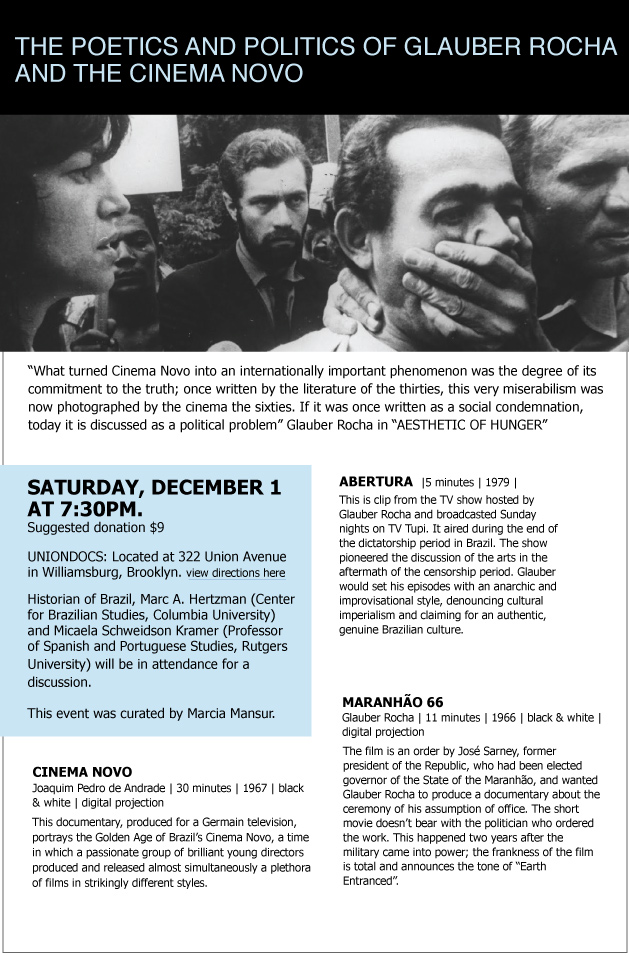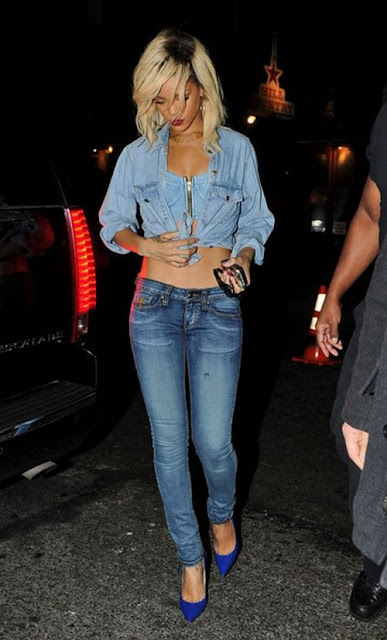UnionDocs brings Glauber Rocha to ' life' in Williamsburg!
This Saturday, December 1st, at 7:30 pm, UnionDoc brings our amazing Glauber Rocha to ' life' in Williamsburg - New York.
Glauber de Andrade Rocha (March 14, 1939 – August 22, 1981) was an influential Brazilian film director, actor and writer.During his adolescence, he developed great interest in arts, especially theatre and cinema, and even joined a drama group. He was also very active in politics, a trait that would be strongly influential in his works. A member of the Brazilian radical left, he helped start a political party in the late 1980s that called for an anti-capitalist people's revolution and, among other things, advocated the abolition of money.
In 1971, during the Brazilian military dictatorial regime, he left the country to a voluntary exile, dwelling in many places, such as Spain, Chile and Portugal. He never completely returned home until his last days, when he was transferred from Lisbon, where he had been receiving medical treatment for a lung infection, to Rio de Janeiro. Rocha resisted in hospital for few days, but ultimately died on August 22, 1981, at the age of 42.
UnionDoc then decided to represent GR visceral cinema movement through documentaries in terms of aesthetics, artistic philosophy and ideological approach to the arts, bringing 3 short movies to NYC this Saturday. Thus, to start with, the curator Marcia Mansur & UnionDocs chose to present the political context through the eyes of Glauber Rocha with the film Maranhão 66.
José Sarney, the politician whose speech is portrayed, had just won the elections to lead the state of Maranhão and asked Glauber to make a video, a kind documentary propaganda to influence public opinion. What happened were two things: on the one hand the film was never used for the means it was expected to. On the other, 20 years later, Sarney became the president of Brazil.
Glauber was part of the TV show Abertura, and we can say his participation was like a news feed on the independent arts scene.The clip is from 1979 - the very first year after the dictatorship period that lasted 15 years, with a tough censorship upon the arts production. Literary criticism, Theater, Cinema. He would freely tackle the relations between politics and culture. He mentions Embrafilme - the governmental agency for distribution of national cinema, and the relations between politics and the artists.
Glauber Rocha entrevista Brizola no Programa Abertura da TV Tupi
The documentary Cinema Novo was directed by Joaquim Pedro de Andrade, which is one of the greatest representatives of the Cinema Novo movement. He portrays 5 filmmakers while they were producing landmarks of that period. Joaquim was filming his closest friends, so it is an intimate look at processes that after all, he was also part of. With Cinema Novo - the film, you enter the atmosphere of a cinema that was interested in portraying the "real" Brazil, in terms of an engaged content, but also artistically, claiming for authorship and freedom of expression.
#Imperdivel! Suggested donation $9
December 1st, at 7:30 pm @ UnionDoc *322 Union Avenue in Williamsburg, Brooklyn
by Mirella Afonso
Images NET














Comments
Post a Comment